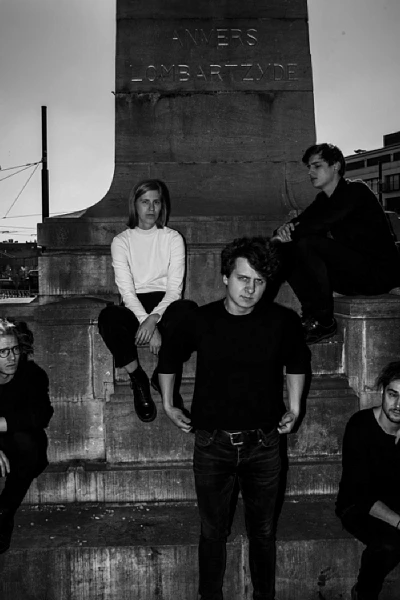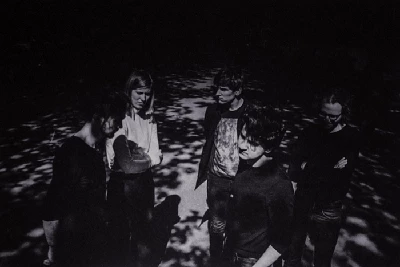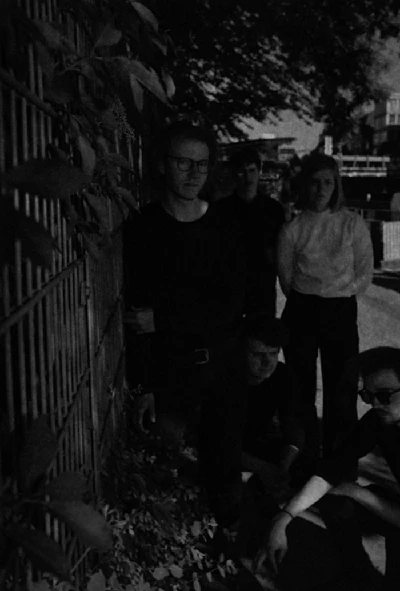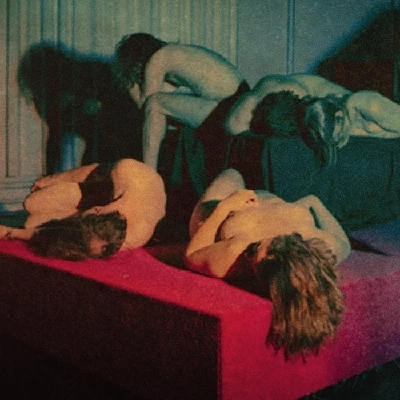published: 26 /
11 /
2018
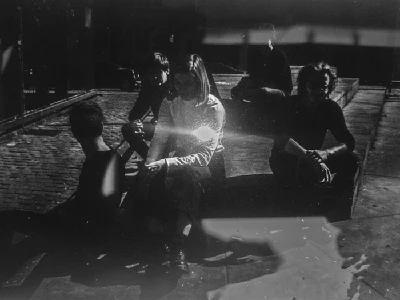
John Clarkson speaks to Fenne Kupppens, the vocalist with Brussels-based post-punk band Whispering Sons, about 'Image', their forthcoming debut album.
Article
Whispering Sons are a Brussels-based 1980’s-influenced post-punk band with a darkly intense sound.
Centred around baritone-voiced female singer Fenne Kuppens, Whispering Sons also consists of Kobe Lijnen (guitar), Sander Hermans (synths), Tuur Vandeborne (bass) and Sander Pelsmaekers (drums). They have released previously an EP ‘Endless Party’ (2015) and two 7” singles, ‘Performance/Strange Identities’ (2016) and ‘White Noise’ (2017).
Their debut album, ‘Image’, will be released on the Hamburg-based label SMILE Records in Europe and on the long-established Los Angeles-based label Cleopatra Records in America on October 19th. Kuppens’ insular, angst-ridden vocals which are sung in English tell of alienation, of being detached and out-of-synchronisation with society at large, and are matched by the other Whispering Sons’ brooding, taut instrumentation which is both claustrophobic and angular in sound.
Its unsettling cover art by photographer Flor Maessen builds further on the feeling of fragmentation and distance, showing five naked men and women, one sitting upright holding his head in his hands, the others spread out across a series of steps, all motionless, close yet separate from one another, in what may or may not be a sauna.
‘Image’ was co-produced by Micha Volders, who has previously produced Meteor Musik and El Guapo Stuntteam and Bert Vliegen who has worked with Sophia.
Pennyblackmusic spoke to Fenne Kuppens about ‘Image’.
PB: Much has been made in the press on the influence of acts like the Cure, Slowdive, David Bowie and Joy Division on your sound. You, however, take your name from an obscure track by the relatively unknown Danish band Moral. Who were they and how did you discover them?
FK: Our drummer Sander has a knack for finding obscure bands from the '80s. One of them was Moral, a very interesting sounding band from Denmark. We started covering the song 'Whispering Sons' in our first rehearsals, before we even had a name for our band. I joined the band a while later and things seemed to fall into place from that moment. We settled on the name Whispering Sons because it felt right.
We don't know much about Moral though. They didn't exist long and didn't release a lot. Once, a couple of years ago, a journalist looked up the members of Moral and tried to contact them to let them hear our music. He actually succeeded and it was a very meaningful and kind gesture.
PB: How much of an influence has your own local music scene in Belgium had on your music? Is there a strong indie scene?
FK: We were not influenced by it at all, to be honest. We've always been kind of the outsider, genre-wise, in our contemporary Belgian music scene. I find Belgium to be more like an all-encompassing scene, rather than it having a strong indie scene for example. The variety of styles and influences is endless, and there is a lot of overlapping genres and projects. Belgium may be small, but it is a very rich country music-wise.
PB: You formed your current line-up as far back as 2013. Why has it taken so long for you to release the album? You’re a very prolific live act and tour Europe a lot, so presumably have had the material ready. Has it simply been a case of finding the time in between all your live work to record the album?
FK: We released our first EP 'Endless Party' in 2015 with the songs we had at that point. After that, we indeed started to play a lot of shows, both in Belgium and in Europe. We wrote new songs in between the periods of touring, and always tried them during the live shows. Eventually, we felt that we were ready to start on that debut album. It has always been more a matter of feeling ready than it was a matter of time. We set our own deadline to finish some more tracks and went to the studio in January 2018.
PB: ‘Image’ was recorded very quickly over a ten day period. It has got an urgent, agitated sound. How much of this short recording period was down to you wanting to capture the intensity of a live show and how much of it was down to finance?
FK: Neither, to be honest. Obviously we wanted to capture a bit of that live feel, but not for every song. So in the end we did some tracks entirely live, only adding overdubs later on; but other ones needed a more attentive approach, so we started building them from the bottom up, adding layer after layer. It definitely wasn't down to finance.
The main reason was that it was important for us to, for our first album, record everything in one period. We were confined to the studio for ten days straight and we worked from early in the morning until very late in the evening. It was intense and hard, but it was also what we needed in order to produce a coherent record. Ten days might seem short and tight, but it turned out to be the perfect amount of time and it worked as a natural selection process for the record. The tracks we didn't have time to record did not make the album. Simple as that.
PB: You all come from villages near Ghent but moved to Brussels. Moving to a big city from the countryside can be a lonely experience. The lyrics on ‘Image’ focus on alienation, feeling on the outside, insomnia, anxiety and claustrophobia. Do you see this move to the city as having been its main lyrical inspiration?
FK: Absolutely. I think a lot of my emotions during that period subconsciously stem from moving to Brussels. It is the well--known phenomenon of feeling lonely in a crowd. I experienced some extreme emotions the first years; from utter euphoria and love for the city, to disgust and anger and extreme loneliness. That's also what you hear on the record.
PB: The front cover art by Flor Maesen is really striking yet also strangely ominous. Where did you discover it? What was the appeal to you of it and what does it suggest to you?
FK: I discovered Flor's work through the artwork he did for another Belgian band. His work is very carnal, dark and not so obvious. He sent us some of his photographs and this one stood out immediately because it was different from everything else he sent. It was more colourful, and less ambiguous; but it still has an atmosphere you can't immediately make sense of. Just like the themes in the record, the cover artwork is a motionless state, in which observations overshadow actions. It's like looking at a strange performance from a distance. It feels artificial, but is still very raw and pure.
PB: ‘Image’ was produced by Micha Volders and Bert Vliegen. What do you think they brought to the recording?
FK: They were both really important. Micha was the perfect guy for producing our first record. His expertise in electronics, synthesizers and drums was exactly what we needed to broaden our sound. We used acoustic drums on this record, whereas on previous releases the drum was completely electronic. Bert was the engineer on this record, but turned out to be more of a co-producer. A striking example of what they brought to the record can be found in 'No Image', the closing track of the album. Micha and Bert brought it to a whole new level by stripping the song, which was originally an up-tempo guitar-based track, to the bare essentials and adding piano and thus giving it a whole new identity.
PB: You are touring Europe during the next six months and are playing a date at a festival in Leicester in March. Will this be your first time in the UK and do you have any plans for any more dates here?
FK: We played our first and only show in the UK in London in October 2017. Of course, we hope to add some more UK dates in March.
PB: Thank you.
Band Links:-
http://www.whisperingsons.com/
https://www.facebook.com/WhisperingSon
https://twitter.com/whisperingsons
Have a Listen:-
Picture Gallery:-
